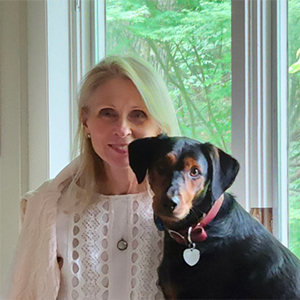
Peregrine Kavros
Biography
Peregrine is an Advanced Schema Therapist Trainer/Supervisor for individuals and couples and Director of the Schema Therapy Institute of the SouthEast. She is passionate about introducing Schema Therapy to therapists worldwide, especially in the Southeastern region of the United States. Peregrine believes that Schema Therapy, as a developmental integrative therapeutic model, is well-suited for clients undergoing life changes, seeking to improve their relationships, or modifying their personalities. Peregrine is actively involved in the International Society for Schema Therapy and serves as Chair of the Ethics and Conflict Resolution Committee, Training and Certification Advisory Subcommittee, and the Couples Special Interest Group. Before moving to North Carolina, she held academic positions at Columbia University and New York University Langone Medical Center. Peregrine has published in peer-reviewed journals, authored book chapters, and contributed to the Encyclopedia of Psychology and Religion (2009) by Springer. In addition to her certifications in Schema Therapy, Peregrine is a National Registered Health Psychologist, certified as a Sex Therapist by AASECT (American Association of Sex Educators, Counselors, and Therapists), and an ordained Episcopal Priest. Her academic and clinical interests in interdenominational faith dialogue and how mindful spirituality enhances the Healthy Adult Mode evolved early in her training. Peregrine finds peace in nurturing her inner child by tending to the beautiful gardens and fantastic creatures on Hyacinth Farm. On this 20-acre farm, she resides with her husband, Harry, their rescue dog, Theo, and a flock of chickens and guinea fowl. She is a member of the Hillsborough Garden Club, which promotes pollination efforts in the United States, the Junior League of Durham and Orange Counties, and other non-profits focusing on conservation, sustainability, and food scarcity.
Fortifying the Schema Therapist’s Healthy Adult Mode Through Self-Practice, Deliberate Practice and Therapist Improv
Co-Presented with Joan Farrell & Wendy Behary
This pre-conference 6-hour workshop combines Self-Practice/ Self-Reflection and Schema Therapy Deliberate Practice exercises, along with improvisational drama exercises to strengthen our inner therapist skills and our good parent voice. The workshop’s goals include increased self-awareness of modes and needs, the ability to access our Healthy Adult Mode when triggered in sessions, the development of a flexible and highly attuned Good Parent, and the construction of self-care plans to use outside of sessions. The workshop will support therapists in building ST intervention mastery as well as their authentic personal style. Deliberate practice exercises and improvisational (method acting) exercises will be employed to support the practice of accessing the “Good Parent voice” of the Healthy Adult Mode when working with clients’ child modes and a firm, confident and secure Healthy Adult Mode when limits for aggressive behavior are required. We will focus on interventions and practice that facilitate mastery of being a “real person” in the treatment room: present, attuned, and genuine, aware of our own schema and mode triggering, and expressing the internal advocate, “good parent” part of the Healthy Adult mode. We will explore the components of one’s HAM, including the role of support from mindful or spiritual beliefs, and examine how early maladaptive schemas influence the quality of these beliefs. We will introduce an expanded needs assessment to assist therapists in fortifying their HAM and building an effective self-care plan. The workshop’s experiential exercises and mindful self-reflection will culminate in a plan for further HAM development. The workshop will employ brief didactic PowerPoint and demonstration. The majority of the workshop time will be spent using experiential exercises with reflection and role-play practice with feedback.
What's Love Got To Do With It: How strengthening the Happy Child and Healthy
In 2019, a study published in the Journals of Gerontology reported that 40% of married adults (1,900 surveyed) ages 57 through 85 had not engaged in sexual intercourse the previous year. In another survey, researchers found that in a group of 18,000 adults from the US, a little over 15 percent had not had sex the previous year, and 13.5 percent had not had sex for five years (Archives of Sexual Behavior, 2018). While these statistics may be surprising to the general population, it is not an unusual finding for a sex therapist. It is important to note, however, that sexless relationships per se are not viewed as a problem if the couple feels balanced and agrees that each is comfortable with the current level of intimacy. For some couples, alternative forms of intimacy, such as cuddling, holding one another, and kissing, are completely satisfying and do not leave the couple feeling imbalanced.
The majority of couples seen in this practice have not engaged in sex for many years, and they are not comfortable with their current expression of intimacy. One such couple reported that their last experience of intercourse was 18 years prior. They continued to consult with therapists seeking a shift in their relationship because neither one of the partners was comfortable with their emotional and physical expression of love and care. In addition to evaluating the couple’s functioning, early maladaptive schemas, and maladaptive coping modes, several interventions, including Schema Therapy, helped to shift this couple’s relationship course. This case presentation includes a review of those interventions and the obstacles to intimacy that had not been sufficiently addressed in prior therapeutic experiences. Most importantly, the interventions that assisted the couple in strengthening the skills of their Healthy Adult Mode and the play capacity of their Happy Child will be highlighted.

